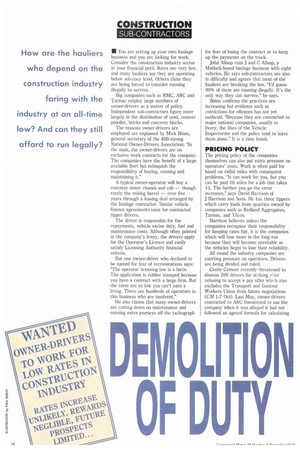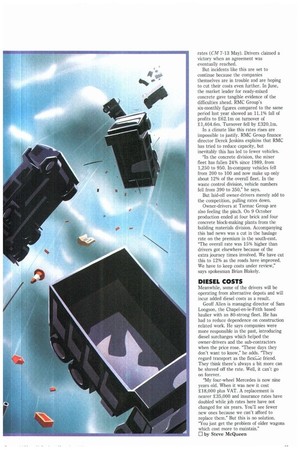EN1OLITION F DUTY
Page 36

Page 37

If you've noticed an error in this article please click here to report it so we can fix it.
• You are setting up your own haulage business and you are looking for work. Consider the construction industry sector at your financial peril. Rates are very low, and many hauliers say they are operating below solvency level. Others claim they are being forced to consider running illegally to survive.
Big companies such as RMC, ARC and Tarmac employ large numbers of owner-drivers as a matter of policy. Independent sub-contractors figure more largely in the distribution of sand, cement powder, bricks and concrete blocks.
The reasons owner-drivers are employed are explained by Mick Binns, general secretary of the 800-strong National Owner-Drivers Association: In the main, the owner-drivers are on exclusive work contracts for the company. The companies have the benefit of a large available fleet but relinquish the responsibility of buying, running and maintaining it."
A typical owner-operator will buy a concrete mixer chassis and cab — though rarely the mixing barrel — over five years through a leasing deal arranged by the haulage contractor. Similar vehicle finance agreements exist for contracted tipper drivers.
The driver is responsible for the repayments, vehicle excise duty, fuel and maintenance costs. Although often painted in the company's livery, the drivers apply for the Operator's Licence and easily satisfy Licensing Authority financial criteria.
But one owner-driver who declined to be named for fear of recriminations says: "The operator licensing law is a farce. The application is rubber stamped because you have a contract with a large firm. But the rates are so low you can't earn a living. There are hundreds of operators in this business who are insolvent."
He also claims that many owner-drivers are cutting down on maintenance and running extra journeys off the tachograph for fear of losing the contract or to keep up the payments on the truck, John Allsop runs J and C Al!sop, a Matlock-based haulage business with eight vehicles. He says sub-contractors are also in difficulty and agrees that most of the hauliers are breaking the law. "I'd guess 90% of them are running illegally. It's the only way they can survive," he says.
Binns confirms the practices are increasing but evidence such as convictions for offences has not yet surfaced. "Because they are contracted to major national companies, usually in livery, the likes of the Vehicle Inspectorate and the police tend to leave them alone." It is a time bomb.
PRICING POLICY
The pricing policy of the companies themselves can also put extra pressure on operators' costs. Work is often paid for based on radial miles with consequent problems. "It can work for you, but you can be paid 10 miles for a job that takes 13. The further you go the error increases," says David Harrison of J Harrison and Sons. He has three tippers which carry loads from quarries owned by companies such as Redland Aggregates, Tarmac, and Tilcon.
Harrison believes unless the companies recognise their responsibility for keeping rates fair, it is the companies which will lose more in the long run because they will become unreliable as the vehicles begin to lose their reliability.
All round the industry companies are exerting pressure on operators. Drivers are being divided and ruled.
Castle Cement recently threatened to dismiss 200 drivers for striking after refusing to accept a pay offer which also excludes the Transport and General Workers Union from future negotiations (CM 1-7 Oct). Last May, owner-drivers contracted to ARC threatened to sue the company when it was alleged it had not followed an agreed formula for calculating rates (CM 7-13 May). Drivers claimed a victory when an agreement was eventually reached.
But incidents like this are set to continue because the companies themselves are in trouble and are hoping to cut their costs even further. In June, the market leader for ready-mixed concrete gave tangible evidence of the difficulties ahead. RMC Group's six-monthly figures compared to the same period last year showed an 11.1% fall of profits to £62.1m on turnover of £1,404.6m. Turnover fell by £320.1m.
In a climate like this rates rises are impossible to justify. RMC Group finance director Derek Jenkins explains that RMC has tried to reduce capacity, but inevitably this has led to fewer vehicles.
In the concrete division, the mixer fleet has fallen 24% since 1989, from 1,250 to 950. 1n-company vehicles fell from 200 to 100 and now make up only about 12% of the overall fleet. In the waste control division, vehicle numbers fell from 390 to 350," he says.
But laid-off owner-drivers merely add to the competition, pulling rates down.
Owner-drivers at Tarmac Group are also feeling the pinch. On 9 October production ended at four brick and four concrete block-making plants from the building materials division. Accompanying this bad news was a cut in the haulage rate on the premium in the south-east. The overall rate was 15% higher than drivers got elsewhere because of the extra journey times involved. We have cut this to 12% as the roads have improved. We have to keep costs under review," says spokesman Brian Blakely.
DIESEL COSTS
Meanwhile, some of the drivers will be operating from alternative depots and will incur added diesel costs as a result.
Geoff Allen is managing director of Sam Longson, the Chapel-en-le-Frith based haulier with an 80-strong fleet. He has had to reduce dependence on construction related work. He says companies were more responsible in the past, introducing diesel surcharges which helped the owner-drivers and the sub-contractors when the price rose. "These days they don't want to know," he adds. "They regard transport as the flexie friend. They think there's always a bit more can be shaved off the rate. Well, it can't go on forever.
"My four-wheel Mercedes is now nine years old. When it was new it cost £18,000 plus VAT. A replacement is nearer £35,000 and insurance rates have doubled while job rates here have not changed for six years. You'll see fewer new ones because we can't afford to replace them." But this is no solution. "You just get the problem of older wagons which cost more to maintain."
0 by Steve McQueen
















































































